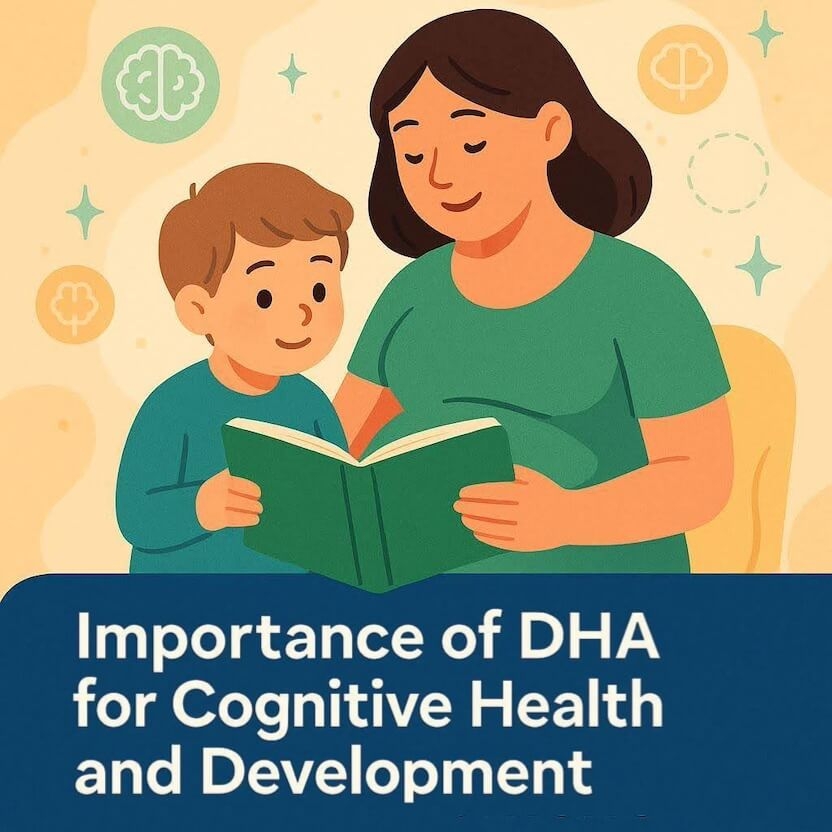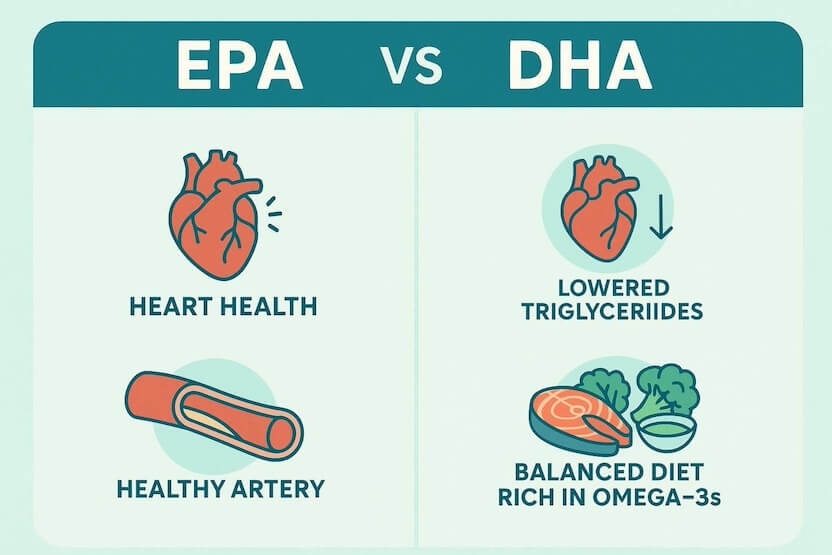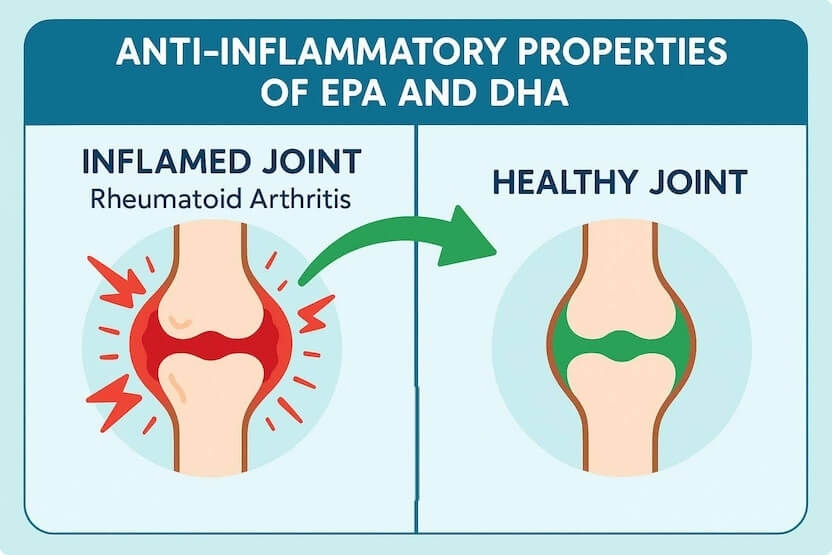Last update: July 16, 2025
6 minute read
EPA vs DHA Omega 3: Which Essential Fatty Acid Is Best for Heart, Brain, and Immune Health?
Discover the unique benefits of EPA vs DHA omega-3 fatty acids and learn how to choose the right supplement for cardiovascular, cognitive, and immune wellness.

By Derick Rodriguez, Associate Editor
Edited by Stephanie Wright, RN, BSN

Omega-3 fatty acids often buzz around wellness circles, but do you really understand what makes EPA and DHA unique? These essential nutrients aren’t mere diet trends; your body literally depends on them for critical brain function, heart health, and inflammation management.
Whether you’re seeking sharper cognitive performance or stronger cardiovascular health, choosing the right omega-3 supplement—like a high-quality fish-oil formulation from VitaRx—can make all the difference.
Key takeaways
- EPA primarily supports cardiovascular health by reducing inflammation and lowering triglycerides
- DHA is crucial for brain function, cognitive development, and eye health, especially during pregnancy and early childhood
- Both EPA and DHA give anti-inflammatory benefits and support immune-system control
Understanding omega-3 fatty acids and their importance in wellness
Omega-3 fatty acids aren’t just good for you; they’re essential. Your body can’t make them well, so you need to get these fats from food or supplements. They play a key role in keeping cell membranes healthy, supporting major body systems, and managing inflammation.
Omega-3s are used to build cell membranes throughout your body and affect the function of cell receptors, benefiting everything from cardiovascular to cognitive health.
Now that we’ve covered why omega-3s are essential, you may wonder: how many types of omega-3s are there? The three most important are ALA (alpha-linolenic acid), EPA (eicosapentaenoic acid), and DHA (docosahexaenoic acid).
Made by microalgae
DHA and EPA are mostly made by microalgae at the base of the marine food chain; fish only accumulate them in their tissues.
The role of omega-3 fatty acids in health
Omega-3s play key roles in many aspects of health. Specific omega-3 fatty acids can help reduce heart-disease risk, support autoimmune-condition management, and aid brain and eye development.
But wait—does your body use these omega-3s the same way? Not exactly.
While ALA must be converted into EPA and DHA, the conversion is generally inefficient—estimates are usually <10 % for EPA and <1–5 % for DHA, with considerable individual variation.

Introducing EPA and DHA: The key omega-3 components
These long-chain omega-3s are abundant in fatty fish like salmon, mackerel, and trout, as well as shellfish like mussels and oysters. In contrast, plant sources (walnuts, flaxseed) provide ALA, which your body struggles to convert.
Still scratching your head about ALA versus EPA and DHA? Think of ALA as raw material—helpful but not nearly as impactful until your body converts it into the forms, EPA and DHA.
EPA vs DHA: Chemical structures and biological functions
Chemical composition and structural differences
EPA has 20 carbons, while DHA has 22. That seemingly tiny difference changes how each fatty acid behaves in your body and explains its distinct health effects.
Omega-3 Fatty Acid | Primary Function |
|---|---|
EPA | Creates eicosanoids that fight inflammation |
DHA | Supports brain & eye health and fetal development |
Biological roles in your body
EPA is best known for its anti-inflammatory action. DHA, meanwhile, makes up about 97% of the omega-3 content in your brain and strongly influences vision and cognitive function.
But what does that mean day to day? EPA helps your body handle inflammation, while DHA fuels quick thinking, learning, and sharp vision.
Your brain is fat
Approximately 60% of the brain’s dry weight is lipid (fat), making it one of the most lipid-rich organs in your body.
Health benefits: Comparing the effects of EPA and DHA
Effect on cardiovascular health
EPA is especially linked to lower triglyceride levels and reduced inflammation. DHA also supports heart rhythm and healthy blood pressure. Using both together covers more cardiovascular needs.
Fish (3-oz. Serving) | Omega-3 content (EPA + DHA) |
|---|---|
Mackerel | 2.0 g |
Salmon (farmed, Atlantic) | 1.7 g |
Herring (Atlantic) | 1.3 g |
Anchovy | 1.2 g |
Salmon (wild, Atlantic) | 1.2 g |
Sardines (canned in oil) | 0.8 g |
Tuna (Bluefin) | 1.0 g |
Eating fatty fish twice a week is a practical way to meet these targets.
Plant-based eater? Opt for algal-oil supplements to secure direct DHA—and often EPA—without seafood.

Effects on mental health and cognitive function
DHA stands out for cognitive health. During pregnancy and childhood, adequate DHA supports brain and eye development. In adults, DHA paired with EPA helps maintain memory and mood balance.
Life Stage | Omega-3 Priority |
|---|---|
Pregnancy / Infancy | DHA |
Adult Cognitive Health | DHA + EPA |
Mood / Depression | EPA (plus some DHA) |
Anti-inflammatory properties and immune system control
Both EPA and DHA reduce inflammation, but EPA often acts faster by shifting eicosanoid production toward less-inflammatory compounds.
Fish-oil supplementation has been shown in some studies to modestly improve certain rheumatoid arthritis symptoms, like morning stiffness, although results are not consistent across all trials.
VitaRx Tip
Fish-oil supplements contain negligible mercury, making them a safer choice for those worried about seafood contaminants.

Choosing the right omega-3 supplement: EPA, DHA, or both?
Factors to consider when choosing a supplement
- Goal-based selection: Cognitive support? Choose DHA. Cardiovascular / inflammation support? Emphasize EPA.
- Typical dosage: 250–1,000 mg combined EPA + DHA daily.
- Safety check: High doses may cause mild stomach upset or interact with blood thinners—consult your healthcare provider.
- Quality assurance: Look for third-party testing to verify purity and potency.
Some analyses of U.S. Omega-3 supplements have found average EPA and DHA contents reasonably close to label claims, whereas others have reported larger deviations; product quality can vary by brand.
Age Group | Adequate Intake (g/day) |
|---|---|
Adults (19 – 50 yrs) | 1.6 g (M) / 1.1 g (F) |
Pregnancy | 1.4 g |
Lactation | 1.3 g |
Older Adults (51 + yrs) | 1.6 g (M) / 1.1 g (F) |
Need a quick conversion? A typical fish-oil softgel provides ≈ 300 mg EPA + DHA, so three capsules ≈ 1 g.
VitaRx’s Omega-3 supplements: A balanced approach
At VitaRx, we design omega-3 formulas that deliver a research-backed balance of EPA and DHA—making it easy to line up your supplement routine with your personal health goals.
Frequently asked questions (FAQ)
Here are some of the most frequently asked questions about omega-3 fatty acids.
Final thoughts
Both EPA and DHA play starring roles in omega-3 nutrition. EPA excels at reducing inflammation and supporting cardiovascular health, while DHA shines in cognitive development and mental sharpness.
Are your current wellness strategies lined up with your health goals? We invite you to consider how EPA and DHA could elevate your daily routine—and remember, high-quality supplements tailored to your needs may help you unlock the healthiest version of you!
Sources and references
- Omega-3 Fatty Acids & the Important Role They Play
- Omega-3 and -6 Fatty Acids Alter the Membrane Lipid Composition and Vesicle Size to Regulate Exocytosis and Storage of Catecholamines | ACS Chemical Neuroscience
- Omega-3 Fatty Acids - Health Professional Fact Sheet
- Is docosahexaenoic acid synthesis from α-linolenic acid sufficient to supply the adult brain? - ScienceDirect
- EPA vs. DHA: understanding the differences and why they matter for your health
- Docosahexaenoic Acid - an overview | ScienceDirect Topics
- Brain lipidomics: From functional landscape to clinical significance - PMC
- Effects of Omega-3 Polyunsaturated Fatty Acids on Brain Functions: A Systematic Review - PMC
- Role of Omega‐3 Polyunsaturated Fatty Acids in the Production of Prostaglandin E2 and Nitric Oxide during Experimental Murine Paracoccidioidomycosis - Sargi - 2013
Editor

Derick Rodriguez
Derick Rodriguez focuses on editing health and wellness-related content. With over half a decade of experience in the digital realm, Derick has developed a unique skill set that bridges the gap between complex health concepts and accessible, user-friendly communication. His approach is deeply rooted in leveraging personal experiences and insights to illuminate the nuances of health and wellness topics, making them more approachable and empowering readers with knowledge and confidence.
Author

Stephanie Wright
Stephanie brings over 13 years of diverse nursing experience to the table, having honed her expertise in critical care, mental health, and utilization management. Her journey as a registered nurse across these various healthcare sectors underscores her adaptability and deep commitment to patient care.
At VitaRx, we're not just passionate about our work — we take immense pride in it. Our dedicated team of writers diligently follows strict editorial standards, ensuring that every piece of content we publish is accurate, current, and highly valuable. We don't just strive for quality; we aim for excellence.
Related posts
While you're at it, here are some other relevant articles you might be interested in.

Get your personalized vitamin recommendations in less than
5 minutes.
Get your personalized vitamin recommendations in less than
5 minutes.






